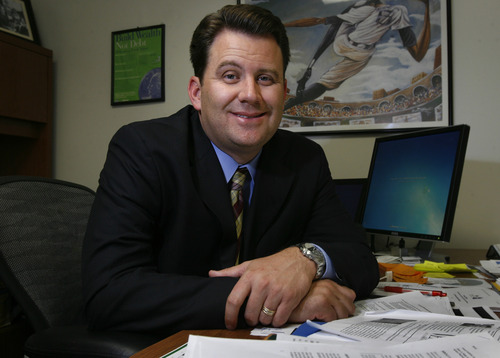This is an archived article that was published on sltrib.com in 2013, and information in the article may be outdated. It is provided only for personal research purposes and may not be reprinted.
The interview went well, you feel good about your job prospects, and then the employer asks to pull your credit report.
Allowing a future boss to see the black marks of personal misfortune can certainly be humiliating, but it also could cost you a job. It's a scenario that more applicants across the nation face and one that Utah consumer advocates say also is cropping up here.
Preston Cochrane, president and CEO of AAA Fair Credit Foundation, says there's a lot of anecdotal evidence of Utahns being asked for access to their credit scores during the hiring process.
"Based on the increased demand for our credit counseling services from job-seeking individuals, I would have to say this is definitely becoming more of a common practice," he said.
Federal law allows employers to use credit reports when making employment decisions, such as a new hire or promotion, but there are strings attached. According to the Fair Credit Reporting Act, the employer must tell the applicant in writing that the information could be a factor in a hiring decision. The job candidate must also give permission in writing.
But that can put people looking for work in a particular bind, says University of Utah family and consumer studies professor Robert Mayer.
"Many people (a) don't know that they have to explicitly consent to making this information available and/or (b) feel compelled to consent, making a mockery of the voluntary nature of the process," Mayer said.
On top of that, the applicant could have to foot the bill, says Linda Hilton, director of the Coalition of Religious Communities at Crossroads Urban Center. (Although consumers are entitled to a free credit report from each of the three credit companies — Equifax, Experian and Trans-Union — each year, additional copies can cost up to $11.50 each.)
"One thing that is frustrating to our clients is being asked to pay to get a credit report when applying for a job," Hilton said. "Classic Catch-22, no money for the report, no job without the report."
And a rejection letter could all be because of a mistake. A Federal Trade Commission report earlier this year showed that up to 40 million Americans had errors on their credit reports.
For the past three years, Hilton has been working with the Consumer Federation of America to push for federal legislation restricting the hiring practice. Several states already do — California, Connecticut, Hawaii, Illinois, Maryland, Oregon, Vermont and Washington. Neighboring Colorado's law takes effect July 1.
Utah Department of Workforce Services spokesman Nic Dunn said he's not aware of any move to change Utah law, and that could be because relative few Utah employers appear to be requesting the credit checks on job applicants, compared with other states.
"On occasion, employers in Utah will use a credit check during the hiring process, but this isn't very common," Dunn said.
A 2012 employer survey by the Society for Human Resource Management (SHRM) shows that 34 percent of organizations ran credit checks on job candidates, and it was primarily requested from those applying for financially responsible and executive positions.
Demos, a liberal think-tank, noted that one in four job applicants surveyed in 2012 had been asked to submit to a credit check during the interview process, and that bad credit sank one in 10 applicants.
Twitter: @jnpearce —
Your rights as a job applicant
An employer must ask for permission in writing in order to access your credit report.
Applicant must grant permission.
If an employer rejects you because of bad credit, they must let you know (orally, in writing or electronically) and allow you to dispute the credit report. You can also get an additional free report from the credit reporting company if you ask within 60 days.
Source • Fair Credit Report Act



